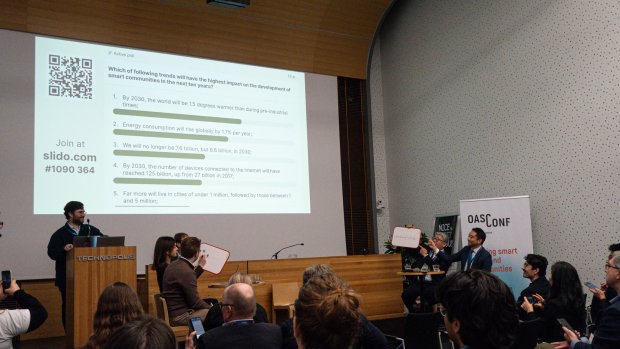Tampere as a Pioneer in Responsible AI Use
 Credit: Business Tampere Oy
Credit: Business Tampere Oy
According to experts, artificial intelligence can help reduce traffic congestion and improve travel efficiency. Predictive maintenance enhances safety and makes transportation more reliable.
At the Open & Agile Smart Cities (OASC) conference, held at Technopolis Yliopistonrinne in Tampere on January 22–23, 2025, experts highlighted Tampere as a prime example of a city developing ethical and citizen-centered AI solutions. The conference emphasized the growing role of AI in urban development and Tampere’s leadership in leveraging AI for the benefit of its residents.
Kristine Alanko, Senior Specialist at the Ministry of Transport and Communications, cited the LUMI supercomputer in Kajaani as a model for sustainable AI. She discussed AI’s potential for predictive disease detection and system maintenance forecasting. Experts noted that such solutions could, in the future, accelerate and improve healthcare accessibility, particularly for the elderly and those living in remote areas.
Carl Mörch, Co-Director of FARI, an independent, non-profit AI research institute based in Brussels, introduced the concept of AI Localism, where AI solutions are tailored to meet local needs. During the conference, experts pointed out that AI could be utilized for planning public transport schedules based on real-time data.
Tampere’s Deputy Mayor, Jouni Markkanen, emphasized the societal benefits of AI, such as the creation of new jobs, while also addressing ethical risks like disinformation and threats to privacy. He called for stronger regulatory frameworks to ensure the responsible use of AI.
Tampere is a city where new technologies can be rapidly tested and implemented. According to OASC Chairman Karl-Filip Coenegrachts, the city is already a frontrunner in numerous digital projects that utilize AI to improve traffic flow and enhance public services. “However, AI must primarily serve the residents by providing them with up-to-date information, enabling them to make better, data-driven decisions,” he stated.
Experts agree that AI has the potential to advance healthcare, transportation, and sustainable development in ways that support residents’ well-being and urban functionality.


